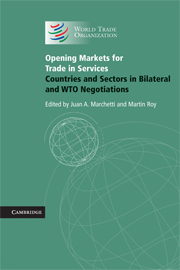Book contents
- Frontmatter
- Contents
- List of figures
- List of tables
- List of boxes
- List of contributors
- Foreword
- Acknowledgments
- Disclaimer
- Summary and overview
- PART I From Policy to Negotiations
- PART II Multilateral and Bilateral Negotiations on Services: Overall Perspectives
- PART III Challenges, Issues and Opportunities in Services Sectors
- 4 Telecommunications: can trade agreements keep up with technology?
- 5 The liberalization of cross-border trade in services: a developing country perspective
- 6 Out of stock or just in time? Doha and the liberalization of distribution services
- 7 Air transport liberalization: a world apart
- 8 Financial services liberalization in the WTO and PTAs
- 9 Beyond the main screen: audiovisual services in PTAs
- 10 The liberalization of postal and courier services: ready for delivery?
- 11 The liberalization of energy services: are PTAs more energetic than the GATS?
- 12 Market access for the government procurement of services: comparing recent PTAs with WTO achievements
- 13 A warmer welcome? Access for natural persons under PTAs
- PART IV Country Experiences with Services Trade
- Index
- References
11 - The liberalization of energy services: are PTAs more energetic than the GATS?
Published online by Cambridge University Press: 05 December 2011
- Frontmatter
- Contents
- List of figures
- List of tables
- List of boxes
- List of contributors
- Foreword
- Acknowledgments
- Disclaimer
- Summary and overview
- PART I From Policy to Negotiations
- PART II Multilateral and Bilateral Negotiations on Services: Overall Perspectives
- PART III Challenges, Issues and Opportunities in Services Sectors
- 4 Telecommunications: can trade agreements keep up with technology?
- 5 The liberalization of cross-border trade in services: a developing country perspective
- 6 Out of stock or just in time? Doha and the liberalization of distribution services
- 7 Air transport liberalization: a world apart
- 8 Financial services liberalization in the WTO and PTAs
- 9 Beyond the main screen: audiovisual services in PTAs
- 10 The liberalization of postal and courier services: ready for delivery?
- 11 The liberalization of energy services: are PTAs more energetic than the GATS?
- 12 Market access for the government procurement of services: comparing recent PTAs with WTO achievements
- 13 A warmer welcome? Access for natural persons under PTAs
- PART IV Country Experiences with Services Trade
- Index
- References
Summary
Energy is an indispensable component of daily life. It gives us light, allows us to cook our food and heat – or cool – our homes, and transports us on road, rail, or water, or in the air. It underpins all economic activities. A lack of reliable and affordable energy supply affects human welfare and economic development. The importance of this sector for social and economic life, coupled with the specificities of energy trade, have led governments to be directly involved in the provision of energy goods and services. Until the beginning of the 1990s the structure of the energy sector left limited room for private operators. The market was dominated by large, vertically integrated state-owned utilities, which were responsible for the whole chain, from exploration and production to marketing and sale to the final consumer; trade in energy was seen essentially as trade in goods, in which services were a value added element. Moreover, many countries endowed with energy resources were not members of the GATT/WTO.
This explains why energy was a missing chapter of the services negotiations during the Uruguay Round (1986–94) and why current GATS commitments are scarce. As in other infrastructure service sectors, however, the situation has changed over the last fifteen years. The trend toward privatization and liberalization in a number of countries, together with technological developments, have contributed to the emergence of new service activities for private operators.
- Type
- Chapter
- Information
- Opening Markets for Trade in ServicesCountries and Sectors in Bilateral and WTO Negotiations, pp. 405 - 434Publisher: Cambridge University PressPrint publication year: 2009



